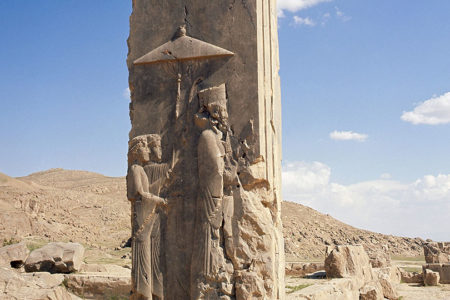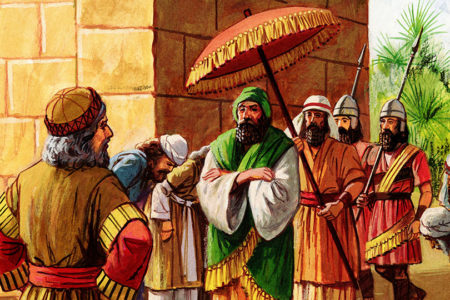The Accomplishments of Faith
Hebrews 11:32–40
The beginning of Hebrews 11 describes faith. Then it systematically illustrates it in the lives of those who lived before the patriarchal period until Israel crossed the Jordan River into the Promised Land (vv. 1–31). Then the author expressed his quandary: “What more shall I say? For the time would fail me to tell” (v. 32).
To mention all the faithful individuals in Israel’s history would be too time-consuming. Thus, for the remaining verses of chapter 11, he selected a few faithful individuals to illustrate that the principle of faith was manifested through Israel’s history.
Six men of faith from the period of the judges, kings, and prophets are listed out of chronological order. In the Old Testament, Barak precedes Gideon, Jephthah precedes Samson, and Samuel precedes David. Scripture does not say why these men were chosen or why they were presented in this order (v. 32).
We do know they were ordinary men whom God called on to accomplish extraordinary feats of faith after being endowed and energized by the Holy Spirit. These men appear in verse 32 exclusively because of their faith.
People of Faith
Gideon (cf. Jud. 6—9). The Lord sent Gideon to save Israel, which was groaning under Midianite oppression (6:14). God’s plan was to defeat the Midianites with a mere 300 Israelite soldiers. Against overwhelming odds, Gideon put unwavering faith in God’s plan and power and defeated the Midianite coalition of 135,000 men. In confusion, the Midianites fought one another and eventually fled from the Israelites (7:1–25; 8:10).
Barak (cf. Jud. 4—5). King Jabin of Canaan had suppressed Israel for 20 years, and the nation cried out to God for deliverance. The Lord promised Deborah, the judge of Israel, that she would defeat Sisera, the captain of Jabin’s army, who had 900 iron chariots under his command. The Lord told Deborah to ask an obscure man named Barak to muster an army of 10,000 men from the tribes of Naphtali and Zebulun, assemble them atop Mount Tabor, and charge down the mountain. There the Lord would defeat the Canaanites.
Many believe it was Deborah, not Barak, who had faith to believe Israel would triumph. Not so. Barak was a fearless warrior of faith who willingly fought Sisera. Barak wanted Deborah with him, not because he was fearful, but for her spiritual wisdom and direction as the Lord’s spokesperson (4:1–24).
Samson (cf. Jud. 13—16). Samson was a judge in Israel who was given a special mission: Oppose the Philistines oppressing Israel. He is best known, not for his faith, but for his physical strength, immaturity, selfwill, self-confidence, and foolishness in trusting the pagan woman Delilah who brought him down. Nevertheless, God used him in many situations to defeat the Philistines. On those occasions, Samson exercised faith in God to perform mighty acts, never doubting that his power and strength came from God.
Jephthah (cf. Jud. 11—13). Jephthah, the son of a harlot, became a soldier of fortune whom God later selected to be a judge to fight the Ammonites. Despite his downfall by making an awful vow, Jephthah was a man of faith. He trusted totally in God’s power, manifested great faith in the Lord, and believed he would be victorious over the Ammonites.
David. King David exercised great faith when he killed a lion, a bear, and the Philistine giant Goliath. His faith never wavered when he ran from Saul, who sought his life; faced rebellion within his own family; and directed and fought wars while king. Despite his gross sins of adultery and murder, God called him “a man after My own heart, who will do all My will” (Acts 13:22; cf. 1 Sam. 13—22).
Samuel. Samuel was called as a child to be a priest and prophet. Later he became the last judge over Israel (1 Sam. 3:10, 20–21; 7:15–17). He exercised great faith, standing against Israel’s enemies (Philistines, Amorites, and Ammonites) and courageously opposing King Saul, who was disobedient to the Lord. While Saul was still in office, Samuel exercised faith in anointing David to be king (13:1–14; 16:1–2, 12–13).
Prophets. There were many prophets of faith in Israel, but the author did not list them.
Persecution of the Faithful
In quick succession, Scripture lists many great examples of faith, even during persecution, but does not name names.
Triumphs of Faith (Heb. 11:33–35)
- Subdued kingdoms: Gideon, Barak, Samson, Jephthah, and David.
- Worked [performed acts of] righteousness: Through faith they walked uprightly and lived righteously. Samuel and the prophets were such examples.
- Obtained promises: What God promised He provided, especially specific victories over Israel’s enemies, as promised to Gideon, Barak, and David.
- Stopped the mouths of lions: This was true of Samson (Jud. 14:5–6), David (1 Sam. 17:34–36), and Daniel (Dan. 6:16–23).
- Quenched the violence of fire: Shadrach, Meshach, and Abed-Nego survived in King Nebuchadnezzar’s fiery furnace (Dan. 3).
- Escaped the edge of the sword: Many within Israel escaped being killed by adversaries, including Moses (Ex. 18:4), Elijah (1 Ki. 19:1–3), and Elisha (2 Ki. 6:31).
- Out of weakness were made strong: Gideon (Jud. 6:14–16), Samson (16:30), and David (1 Sam. 17) all were weak but by faith were made strong.
- Became valiant [brave] in battle [and] turned to flight the armies of the aliens: Such was true of Joshua, some judges, and especially King David.
- Women received their dead raised to life again: Elijah raised from the dead the son of the woman of Zarephath (1 Ki. 17:17– 24), and Elisha raised the son of a Shunammite woman (2 Ki. 4:18–37).
Trials of Faith (Heb. 11:35–37)
- Others were tortured, not accepting deliverance, that they might obtain a better resurrection: The word tortured (Greek, tumpanizo) means to “to beat a drum”; thus the torture involved being beaten. The tympanum as an instrument of torture seems to have been a wheel-shaped frame upon which criminals were stretched and beaten with clubs or leather whips.
The Greek text reads “the deliverance,” referring to a specific deliverance offered to Christians if they would deny their faith. However, those being tortured refused the offer because they looked to “obtain a better resurrection” (v. 35). They preferred to die, rather than renounce Christ, knowing they would experience eternal life in their resurrected bodies. - Others had trial of mockings and scourgings…chains and imprisonment: Many Old Testament prophets experienced such persecution, particularly from their own countrymen. Yet they never wavered in their faith or commitment, nor did they compromise the message God asked them to deliver.
- They were stoned: Stoning was Israel’s usual form of capital punishment. Zechariah, the son of Jehoiada, likely was stoned to death (2 Chr. 24:20–22), as was Stephen who was falsely accused of blasphemy (Acts 7:55–60).
- They were sawn in two: Jewish tradition has taught that Isaiah the prophet died by being sawed in half.
- Were tempted. Satan tempted believers with discouragement and doubt when they were called on to exercise faith. Moses was tempted with position, wealth, and the pleasures of sin before he left Pharaoh’s court in Egypt. Job was tempted to doubt God because of his suffering, and Daniel was tempted to compromise his faith while a captive in Babylon.
- Were slain with the sword: Elijah said Israel slew its prophets with the sword (1 Ki. 19:10). Evil Queen Jezebel had many prophets slain (18:4). Herod Agrippa had James slain by the sword (Acts 12:2).
- They wandered about in sheepskins and goatskins, being destitute, afflicted, tormented: Men and women of faith became outcasts. Elijah wore goatskins. Often prophets in Israel were destitute, afflicted, and tormented physically and verbally.
- They wandered in deserts and mountains, in dens and caves of the earth: This fact was true of 100 prophets whom Obadiah saved from Jezebel’s wrath by hiding them in two caves (1 Ki. 18:4). Many people of faith experienced such things through the centuries.
Scripture describes these people as individuals “of whom the world was not worthy” (Heb. 11:38). The world had no use for people of faith and poured contempt on those who were forced to flee their godless persecutors. Some believers had to live in caves and the desert.
Promise to the Faithful
The author then summarized chapter 11. First, the faithful received God’s approval because they “obtained a good testimony through faith” (v. 39). They demonstrated that believers can live lives of faith and will be rewarded by God. The list in Hebrews 11 is merely a sampling of godly people in the Old Testament.
Second, these faithful anticipated receiving what God had promised but “did not receive the promise” (v. 39). Old Testament believers looked for a Messiah who would provide a Messianic Kingdom filled with national and spiritual blessing. Although they never saw the Kingdom in their day, they died in faith believing God would do what He promised.
Then the author drove home his application: “God having provided something better for us, that they should not be made perfect apart from us” (v. 40). The Old Testament saints received promises from God because of their faith, but they did not receive the promise apart from us. In other words, the promise of salvation and the Messianic Kingdom for all believers could not be completed until after Christ’s death and resurrection. Old and New Testament believers will be made “perfect” (complete, v. 40) at the same time: at their glorification and return to Earth at Christ’s Second Coming.
The testimony of the Old Testament faithful is an appeal to all believers, especially first-century Jewish believers who were considering a return to Judaism because of persecution. Instead, they were to take heart and exercise greater faith in God’s promises because they had greater revelation in the resurrected Messiah.
Hebrews 11 illustrates how men and women in ages past exercised great faith despite their circumstances and were triumphant. We should emulate their faith and, like them, with patient endurance, stand firm in our commitment to the Lord no matter what the cost.






